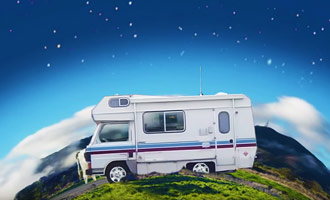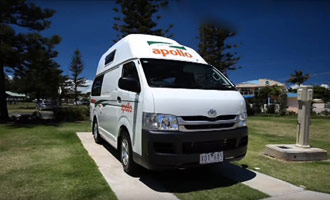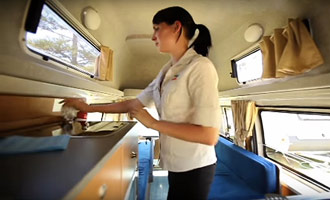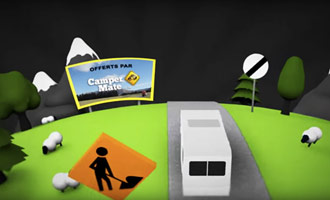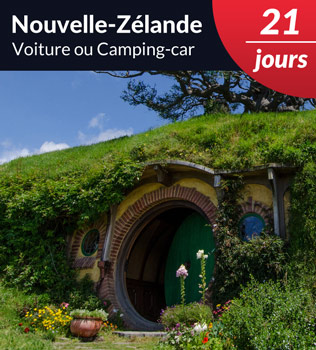
How to Rent a Motorhome in New Zealand.
Please contact us and we will help you to organize your trip! It's free and without commitment.
- Read the post
- Details
- Advices
Presentation.
- 1The Motorhome's Paradise.
- 2The Advantages of a Motorhome.
- 3The Different Models of Motorhome.
- 4The Best Motorhome Brands.
- 5Motorhome Accessories.
- 6Booking Without Travel Agency.
- 7Insurance for Motorhome.
- 8Planning Your Itinerary.
- 9Taking and Returning the Motorhome.
- 10Driving a Motorhome.
- 11Parking Your Motorhome.
- 12Refueling Tank and Gas Bottle.
- 13Battery and Electrical Devices.
- 14Daily Life in a Motorhome.
- 15Dump Station and Drinking Water Refill.
- 16Boarding the Ferry With the Motorhome.
- 17Car or Motorhome?
The Motorhome's Paradise.
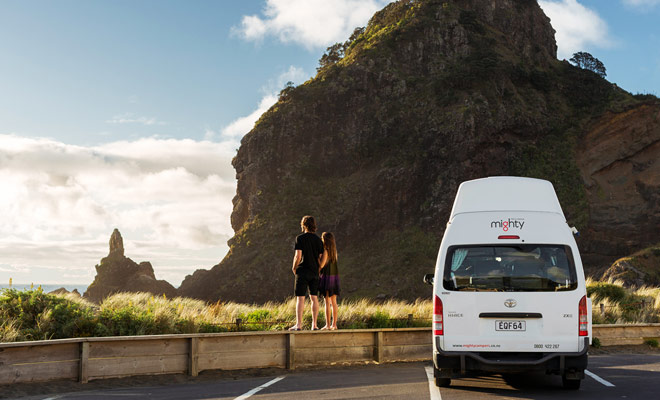
New Zealand is the best country for motorhome road trips.
New Zealand is the undisputed paradise of the motorhome with considerable development considering the low population density of the country.
The vehicles you can rent in New Zealand are similar to European models, and if you have already driven a camper van in your own country, you are already practically ready to take the road.
However, you must be at least 21 years old to rent a motorhome (a condition sometimes accompanied by a certain number of years of experience required). On the other hand, your driving license will be enough, but if you come from a non-English-speaking country you must also possess an international driving license (which is just an official translation of your driving license) usually issued free of charge in your town hall and valid for three years.
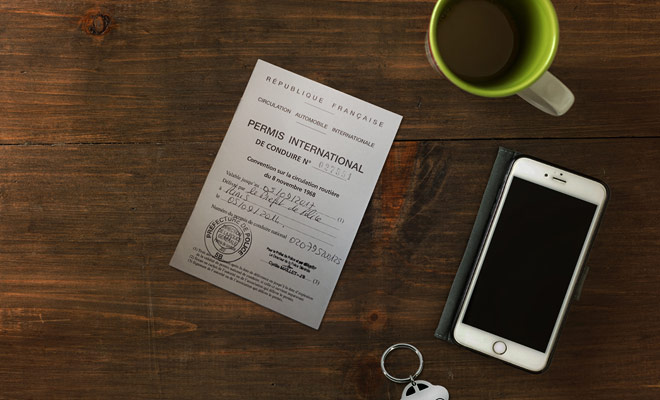
International driving licenses can be mandatory in New Zealand.
Each model of motorhomes has its own characteristics and an interior fitting that varies according to the brand.
Trying to list dozens of models would not be very useful, and this guide is essentially aimed at presenting the rental of a motorhome to beginners.
I will explain step by step how to travel in a motorhome. Rest assured that basic maintenance tasks, such as using dump stations or the refueling, are to be done only every two or three days. The rest of the time, you enjoy your camper van to travel, have lunch with your family or to rest between two treks.
The motorhome is perfectly suited for a family holiday in New Zealand.
Don't be afraid of its size, the motorhome is the perfect way to explore New Zealand. Give me a moment and you'll know all the secrets to rent a camper without paying the expensive services of a travel agency.
In addition, I will explain the subtleties of the New Zealand Highway Code and how to drive on the left side of the road (providing you are not coming from the UK, Australia... or any other country where this is already the case).
The Advantages of a Motorhome.

The motorhome allows to adapt the itinerary according to your desires.
No other means of transport provides such a feeling of freedom! Being able to park in front of a sandy beach, or adapt your itinerary according to your very own desires ... the motorhome brings you closer to the activities in the open air, including in the most remote corners of the country where the first available hotel is a hundred kilometers away.
Getting off the beaten track is not the only advantage of the motorhome! Not being obliged to respect an itinerary to the letter, means that you will no longer endure the bad weather as a fatality. Why undergo rain when you can improvise and leave for a place where the sky is blue?
The motorhome is like a small apartment on wheels, and because you do not have to undo your luggage every night makes the trip with your family easier, especially with a baby that you can change more conveniently than on a motorway picnic area.
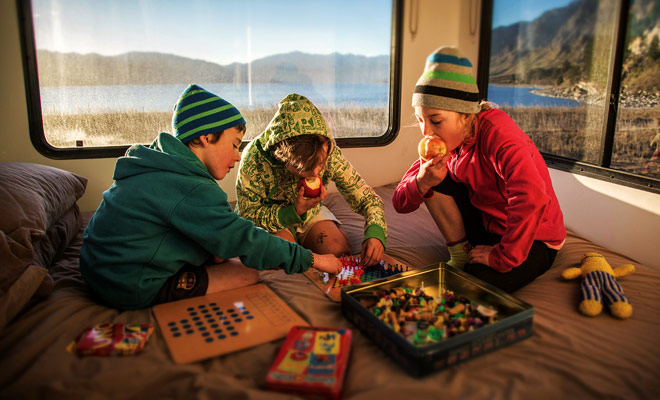
Children usually love Motorhome holidays.
The young children should nevertheless be placed in suitable seats. For more information on regulations, I invite you to visit our special guide about driving in New Zealand.
In addition to bringing freedom, the motorhome allows savings on accommodation and catering.
Cooking on board allows not to resort systematically to restaurants or fast food. You can buy anything you need in supermarkets and cook healthy meals.
But the camper van is above all a state of mind, and the best way to make beautiful encounters. You can, of course, stay with your family all the time, but you can also make friends with travelers from all over the world, or with New Zealanders who will introduce you to their country better than anyone else.
The Different Models of Motorhome.
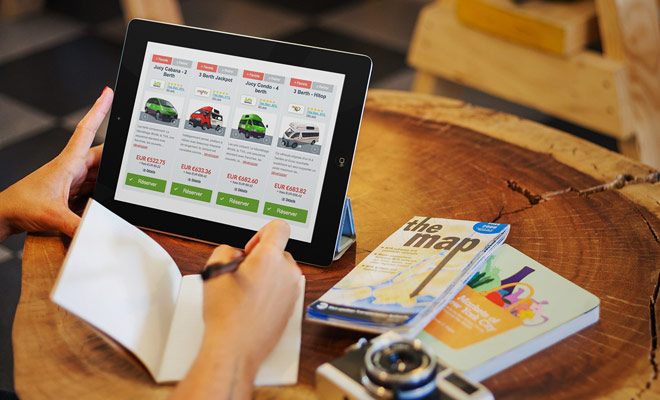
Kiwipal allows you to compare different models of motorhomes.
Before you even begin to compare the different brands of motorhome, you need to decide whether you prefer to drive a model with a manual or automatic gearbox.
Before you even begin to compare different brands of motorhome, you need to decide if you prefer to drive a model with a manual or automatic gearbox.
Both models of gearbox are offered by motorhome rental agencies, but you would be inspired to opt for an automatic gearbox, because if you are not used to the driving on the left you'll have a hard time passing the speeds with your left hand ... The automatic transmission is therefore strongly recommended if you don't come from the UK, Australia or India!
Self-Contained Certification
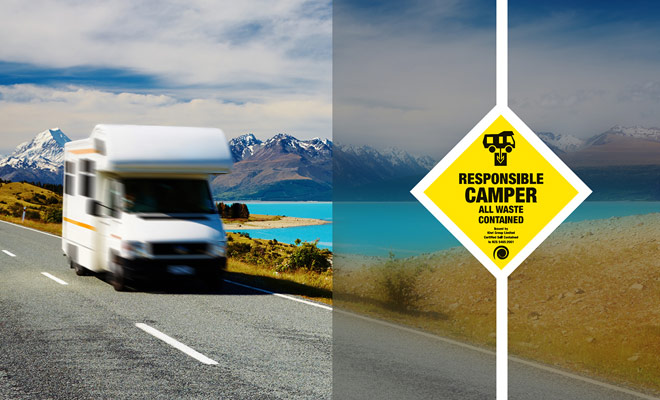
To enjoy free camping, choose a self-contained vehicle.
The self-contained certification is verified by the presence of a sticker affixed to the rear of the vehicle (or a mention on the sticker of the windscreen). It authorizes you to park for free (or in exchange for a few dollars) in the Department of Conservation (DOC) campgrounds as well as in many areas scattered throughout the country.
To be able to park in free campsites, the vehicle must be able to conserve its waste water.
This certification proves that the vehicle you are driving has toilets and does not discharge its wastewater, thanks to a storage capacity of three days. Renting a “self contained” motorhome is therefore a little more expensive, but it simplifies the organization of your stay. Otherwise, you will be forced to park in paid campsites to enjoy the amenities and your budget will rise accordingly.
The Number of Authorized Passengers
The capacity of the motorhome depends on the number of passengers on board. Do not imagine, however, to host more passengers than expected, especially by giving a child bed to an adult, because the experience would be very uncomfortable and would violate the lease established by the rental company.
Models of Motorhome

The camper can also be a light and easy to drive vehicle.
Even if you have never rented motorhomes before, you will quickly realize that there are only three main categories, easily recognizable to their bodywork.
Conventional Coachbuilt Motorhome
In New Zealand, the “Conventional coachbuilt motorhome” has a sleeping area located above the cockpit.
Low profile Coachbuilt Motorhome
In New Zealand, this vehicle is more aerodynamic and more pleasant to drive, with a sleeping area at the back.
Class A Motorhome
The “Class A” motorhome in New Zealand is heavier, but more comfortable and easily recognizable because of its cockpit integrated in the whole bodywork.
The Minivans

The minivan is cheaper to rent but the comfort is inferior.
If the camper does not fit within your budget or seems too cumbersome to maneuver, you may consider renting a minivan or a convertible car from the Spaceship Rentals company.
Nevertheless, these vehicles are not “self contained” and are mainly designed to please backpackers visiting New Zealand with aWorking Holiday Visa.
The minivan complicates the organization of the stay and is more suitable for young travelers.
For if minivans decorated by artists give a nice “retro style” to your trip, they do not have either shower, toilet, or heating ... which imply systematic stopovers in paid campsites or youth hostels. On the other hand, if your stay in New Zealand exceed three months, the purchase of a minivan may be considered as an interesting solution (many young people develop bonds with their vehicle, even giving it a nickname and selling it regretfully at the end of their stay).
The Best Motorhome Brands.
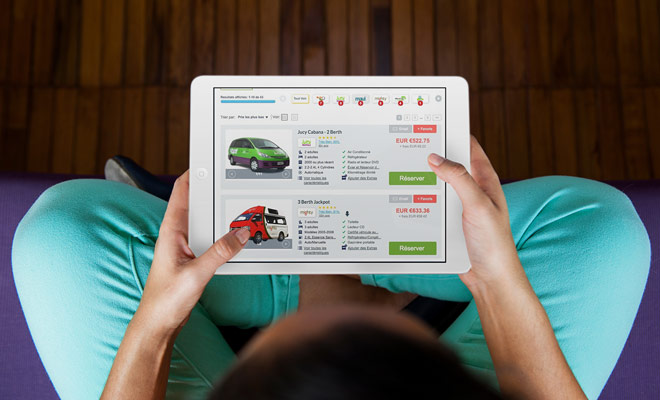
Kiwipal's comparator gathers together almost every rental companies.
Kiwipal's motorhome comparator allows you to book your model online according to the number of passengers. You can trust this service because it gathers almost every vehicle from New Zealand's rental agencies, with the guarantee of the lowest price of the market!
If the number of models proposed may seem important at first sight, the choice is not difficult. I fact, most rental companies configure the same type of vehicle at their convenience.
Such a motorhome has air conditioning or a microwave, another a real oven or more space ... just compare the characteristics of each model as you would for a hotel room.
Maui, Britz and Juicy are the best-known brands, but there are others of very good quality in New Zealand.
The Maui company only offers high-end models, with a fleet of very recent vehicles. Its rival Britz offers cheaper, but slightly older vehicles. Finally, Juicy offers good value for money even if the colorful aesthetics of their vehicles might not appeal to everyone. These three popular brands must be booked well in advance, but there are countless alternatives of very good quality listed in our comparator.
An advantage when renting a brand-name motorhome model is that you can benefit from practical advice when you are staying in paying campsites, because the staff knows these types of vehicles perfectly.
Motorhome Accessories.
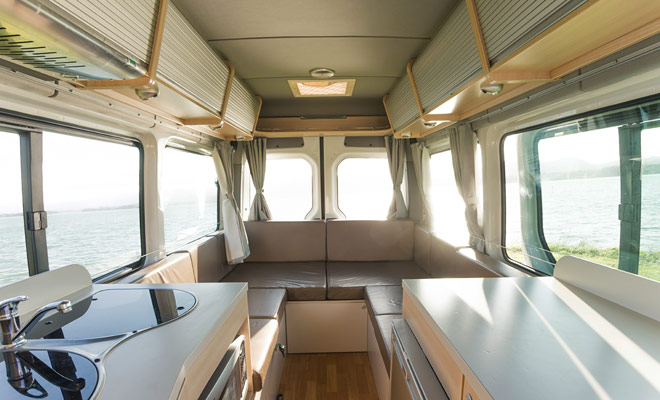
The comfort of modern motorhomes has nothing to envy a good hotel.
The motorhome has basis equipment to which are added additional services offered by the rental companies. This is a real apartment on wheels!
Here is a quick overview of the main accessories usually offered by motorhome rental companies. When booking, take the time to study the available equipment and the optional equipment (such as camping chairs).
Linen
Each camper hire includes sheets, blankets and clean towels. You do not have to bring these in your suitcases and can return them without washing (but in good condition) at the end of your stay. During your holidays, laundry can be done in paid campsites, Holiday Parks or in the Laundromats available in most cities.
Kitchenware
Kitchen utensils are supplied as standard with some washing-up liquid and some sachets of sugar, tea or coffee for the first days of the trip. Some companies provide salt, pepper or oil and even offer to keep the condiments abandoned by previous customers.
Storage Spaces
A motorhome has multiple compartments to store your belongings, but their size is not always large enough to hold suitcases. These occupy an inconvenient place in the cabin and move during transport (which is potentially dangerous). Prefer soft bags that take no space when folded!
Internet Connection
Internet access comes as an option with most rental companies. It takes the form of a USB 3G or 4G key with a volume of prepaid data. You can also connect to the Internet in paid campsites for few dollars.
You can subscribe a prepaid offer in the form of a SIM card of the operator Vodafone whose formulas start at around $25 per month without commitment. A Vodafone shop even awaits you at the Auckland Airport arrival.
Audio Player
Do not overlook the issue of music on board, as you will spend many hours on the road.
The audio CD player although still present has become an antiquity over the years and the ideal is to connect a tablet or a smartphone directly to the vehicle speakers using a 3.1 audio cable if available. If USB ports are becoming more widespread, Bluetooth is still rare.
Do not rely on radio to brighten your journey: the music programming of New Zealand stations is, alas, often execrable (assuming that you are capturing a frequency, which does not come easy in isolated areas).
Booking Without Travel Agency.
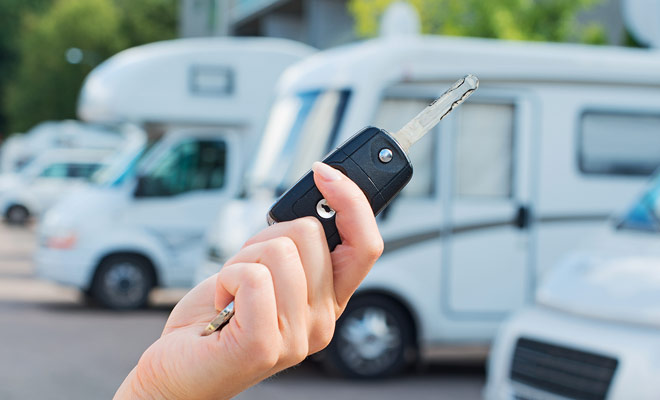
You no longer need a travel agency to rent a motorhome.
There was a time when booking a camper van couldn't be done without the help of a travel agency. Those days are gone, and now you can rent any style camper-van online without paying intermediaries who take their commission in the process.
Because they realize that the rule of the game has changed, some travel agencies are playing on the fear of the unknown to convince you to entrust them with the organization of your stay.
But in reality, the travel agency provides little practical services outside the booking. In case of accident or problems with the motorhome (breakdown, electrical fault ...) you will be in contact with the renter or the insurer who will do the necessary to help you.
Paying a much more expensive rental to avoid a few phone calls in case of problems (which almost never happen anyway) no longer justifies using a travel agency.
Kiwipal Motorhomes Comparator
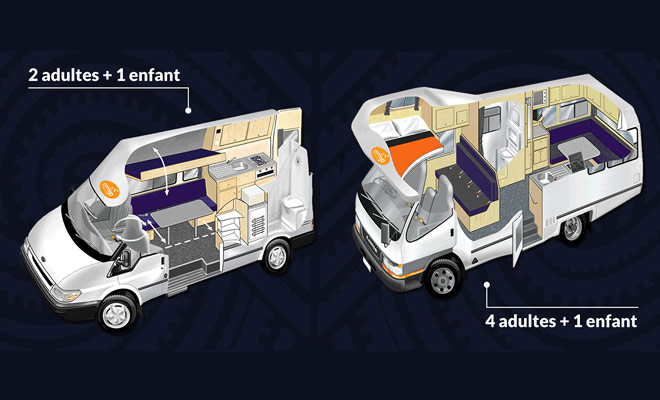
There are models of motorhomes adapted to the number of travelers.
Kiwipal offers you a solution much more advantageous to avoid paying travel agency fees.
We have set up a camper-van comparator with our logistic partner Online Republic. This tool makes it possible to compare the majority of the brands available in New Zealand, and to book directly with a rental company, without paying the expenses of travel agencies.
Your booking request is confirmed within 24 to 48 hours. Your account will usually be debited with a simple deposit at the time of booking, and you will pay the balance in New Zealand.
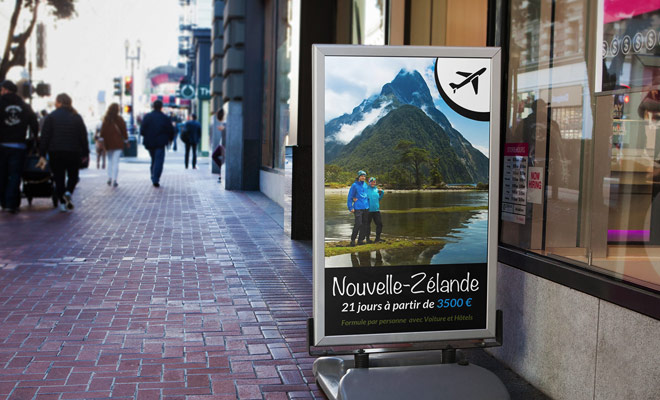
Stays organized by agencies are usually much more expensive.
This solution is a revolution in the field of motor home rentals. Especially since the service offered includes a comprehensive hotline. The formula works so well that more than 100,000 customers have already booked their motorhomes around the world using this booking system.
Compare all kinds of motorhomes available in New Zealand!
Be careful, however, if you are trying to book a motorhome for the high season at the last minute because the market will be saturated and you will sometimes need to make two or three requests before getting a vehicle.
Rest assured, you will not pay a penny until a booking has been confirmed by a rental company.
Of course, the more you book in advance, the easier it is to get a good rate and even some early-booking discounts.
Be patient and do not be discouraged: even in high season it is possible to find a motorhome rental in New Zealand!
The Advantages of Kiwipal
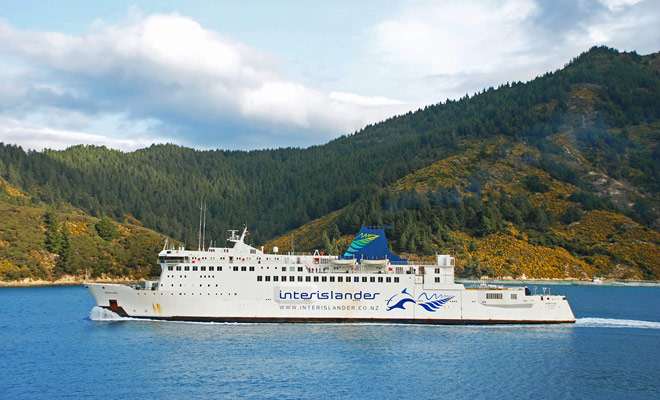
The ferry crossing can also be booked online.
All rentals have unlimited kilometers as long as you rent the motorhome for a minimum of seven consecutive days.
If you are still hesitant to use the Kiwipal service to rent your motorhome, remember that we have negotiated to get you the following benefits:
- Unlimited kilometers
- Lowest Market Rate Guarantee
- Free cancellation on most reservations
- Ability to add a complimentary insurance
- Rental of camping equipment
- Possibility to book the ferry crossing from one island to another
The icing on the cake, Kiwipal does not charge this service, our partner having agreed to trim on his margin to pay us a small commission. You have the certainty of obtaining the best quality-price ratio of the market!
Because you book the motorhome all by yourself, the price is necessarily more competitive than if you add an intermediary in addition to the balance. And you are free to choose your favorite model as well!
Cancellation Policy
The free cancellation depends on the period of withdrawal fixed by each rental company. Here are the rules commonly established, but which can evolve:
- 22 days before departure the cancellation is usually free of charge
- Between 21 and 7 days, the cancellation costs 20% of the rental price
- Between 1 and 6 days, you pay on average 50% of the rental price
- You pay the full amount if you do not show up
Additional Drivers
You may need more than one driver! Most rental companies offer this service, but others apply an extra rate of $1 per day for each additional driver. Careful because if you drive without being listed on the rental agreement, you will not be covered by insurance in case of accident!
How to Book Your Motorhome Online?
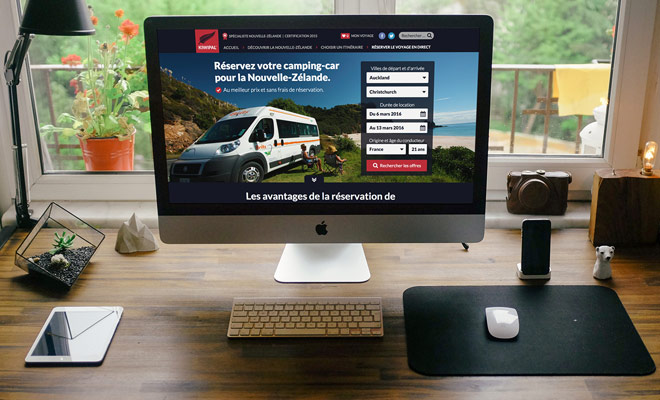
Kiwipal makes it easy to rent motorhomes or cars.
To book your motorhome, you only have to visit the page of our online comparison service. Fill in your booking dates and you will find the right vehicle in no time.
If you are visiting the two main islands of New Zealand, you can get an even more attractive rate by starting your trip to Christchurch rather than Auckland.
Because the rental companies struggle to repatriate their fleets from one island to another, they often give discounts if you follow a route in the opposite direction to the majority of travelers.
Do not wait until the last minute to book, because the stocks of vehicles are not unlimited.
You can get discounts by booking well in advance, but this will only be possible for low season rentals. Because during the summer months (December to March), professionals are sure to rent their vehicles, and they do not need to break their prices to find buyers.
You are mainly exposed to not finding motorhomes available if you wait until the last minute hoping to benefit from a promotion!
I hope to have demonstrated that it is simple to book your camper without a travel agency. The question of the insurance remains to be addressed, I will tell you about it right away and then we will also talk about the construction of your itinerary in New Zealand.
Kiwipal also offers a comparator service for car rentals.
Insurance for Motorhome.

Additional insurance covers the car glass.
The additional insurance offered by the renters of motorhomes does not seem indispensable at first sight, but is strongly advised!
You do not drive a motorhome all year round in a foreign country (and some of you have never driven on the left side of the road) . Even if the risk of accident is statistically low, you are more exposed than usual during a several-week road trip.
Most people imagine that insurance is used exclusively in case of serious accidents. In reality, the cover applies mostly for minor incidents but which can be very expensive (robbery of the camper, water damage, poor choice of fuel ...).
What Is Not Covered by Insurance?
Basic leases do not cover the upper parts of the vehicle or damage to windshields and mirrors.
Taking a motorhome insurance allows to reduce the amount of the deductible, i.e. the maximum amount you will have to pay in case of damages.
Without insurance you must advance every repair costs while waiting for your rental company to reimburse you ...
Feel free to subscribe insurance against glass breakage if available, as it is the most usual problem.
It is necessary to have enough money on your bank account and the total amount to pay must not exceed the ceiling of your credit card! When you are in New Zealand, you won't be able to contact your banker at 3 AM in Europe!
I strongly advise you not to play with fire! Being a good or a bad driver does not change anything in case of trouble, and an insurance allows you to travel more serenely and to fully enjoy your holidays.
Planning Your Itinerary.
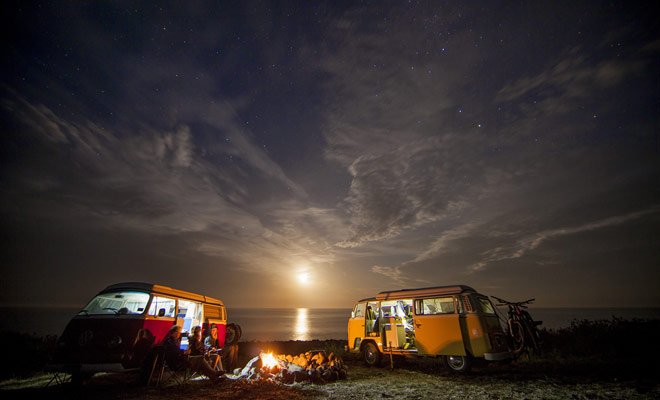
The stay in motorhome requires a minimum of organization.
Planning a camper route is no more complicated than planning a car tour. Instead of sleeping at the hotel, you sleep in your motorhome, and the only question remaining is: where do you park the vehicle for the night?
It is imperative to park your vehicle only at a permitted location (e.g. a campground) because wild camping without the consent of an owner is now banned in the main tourist areas, even if it remains a viable option in a large part of New Zealand.
The prospect of having to pay for a night in a motorhome is perhaps not what you had imagined prior your booking.
But during the peak season, you will have to deal with the influx of visitors and you will be obliged to recharge the batteries of the vehicle, use a dump station or to fill up the tank with drinking water.
Even in motorhomes, you must prepare your itinerary and book some camping nights.
The solution is simple: you just have to spot in advance the camping grounds near the visits or the activities that you wish to do. The process can usually be done entirely in just one weekend for a stay of a few weeks.
Be reassured, Kiwipal offers a guide dedicated to camping with a comparison of all the solutions to park its motorhome. Our guide will help you to build your itinerary while leaving you the freedom to improvise on location.
Taking and Returning the Motorhome.
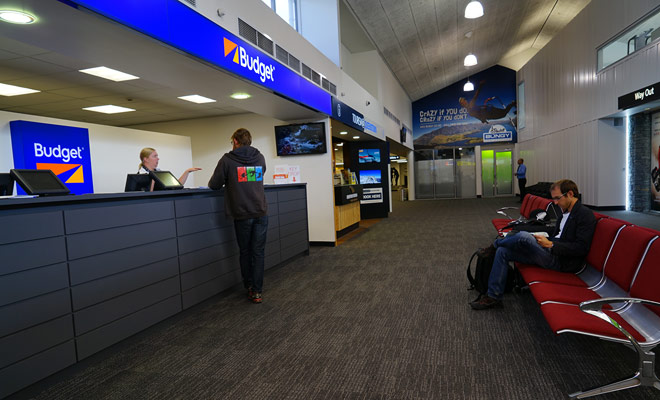
Most motorhome rentals have airport depots.
Motorhome rental agencies run their business near international airports (Auckland, Christchurch, Wellington, Rotorua Dunedin et Queenstown) or even downtown.
The majority of rental agencies have a shuttle service to pick you up at your hotel to take you to their station (free of charge).
The same goes for restitution and you will be dropped off at the airport if the drop-off point is nearby, or at the address of your choice downtown.
Attention: Keep in mind that most rental agencies are only open from 8 AM to 4 PM.
Once there, you will have to fill in the rental contract to validate your Internet reservation. The rental fee will then be debited from your credit card by the camper van rental agent.
Checking the Vehicle
The checking of the vehicle always precedes the delivery of the keys. You will go round the motorhome and the rental agent will realize a complete demonstration of the vehicle, and he will give you a complete manual with sometimes an assortment of maps of the country and the phone number to call in case of emergencies.
Take advantage of the occasion to report the slightest imperfection of the vehicle. The New Zealand hirers are honest, but they can make mistakes or fly over the procedure if they are in a hurry. Don’t be shy! Reporting the presence of a scratch is part of the game and it is not foolish to check that a fridge works!
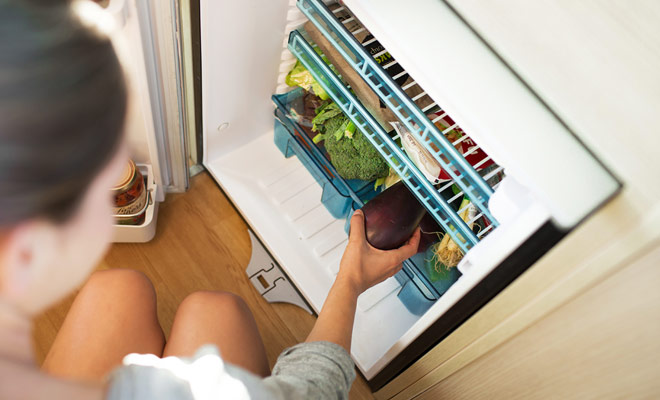
The refrigerator allows you to better manage your food budget.
At the end of your stay, you will simply have to return the motorhome to a rental station on time.
Do not forget to completely empty the motorhome, because every traveler likes to find a vehicle that looks clean and new!
Empty the fridge, and if there are condiments (oil, salt, pepper ...) you can group them in a bag and give them to the rental company which will eventually offer them to the next customers.
A check will be made in your presence to verify the state of the vehicle. Most rental companies will refund the caution within a few working days (an international bank transaction can be slow).
Driving a Motorhome.
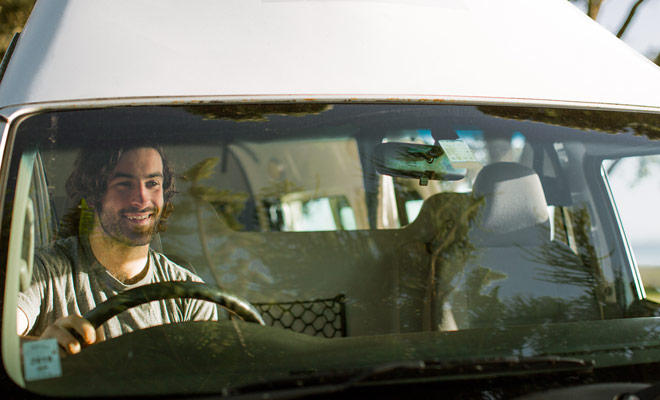
Even beginners can rent and drive a motorhome.
If you have never driven a motorhome (there is always a first step), you must learn a few simple rules to gain experience and feel comfortable behind the wheel. Fortunately, you do not start from scratch because you already know how to drive, but a motorhome is not as handy as a car.
Here are some basic tips to help you get started with your motorhome in New Zealand.
Before Hitting the Road
Before you leave a parking area, you must walk around the vehicle to identify any obstacles on the roadway and make yourself a good mental representation of the distances that separate you from other vehicles. All your belongings must be stored in the closed compartments beforehand so that the inside of the camper does not resemble a supermarket after an earthquake (this is a classic mistake of the beginner who has never rented a motorhome).
Baggage and electronic equipment must be stored during the trip.
You must take into account the height of the vehicle, especially before engaging in underground or tunnels. Keep in mind the height of your camper to look for signs on the road, because the high parts are excluded from insurance! Finally, make sure that all passengers have put their seatbelt, including the ones seated at the back, because a motorhome offers more opportunities to hurt yourself when falling.
Driving in New Zealand
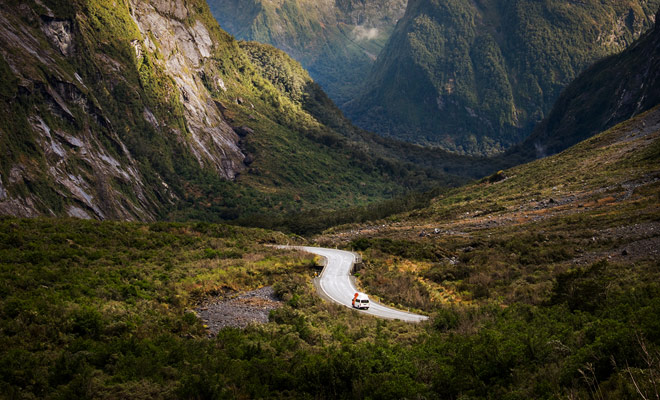
Traffic is particularly fluid in New Zealand.
The maximum speed allowed in New Zealand for a motorhome is 90 km / h (instead of 100 km / h for a car). But considering the very hilly terrain, you will drive on an average of 80 km / h, which gives you enough time to see the obstacles coming, even if you might sometimes feel like dragging yourself on the road.
The speed of motorhomes is limited to 90 km / h in New Zealand.
In reality, the main danger of driving in motorhomes is to turn too fast, at the risk of being deported on the opposite lane. The danger is then real if you cross another vehicle.
Modern motorhomes are not heavy trucks and they are easier and easier to drive. However, you should pay close attention to safety distances because the braking distance is greater than with a car.
Courtesy at the Wheel
Courtesy at the wheel is essential when you drive a motorhome! On winding roads, you might slow the traffic behind you to the point of exasperating all other drivers.
Traffic is very low in New Zealand, and having to drive for twenty kilometers behind a camper-van that does not yield the passage is enough to make other people mad.
Fortunately, there are areas specially designed for slow vehicles which allow to let traffic passing without having to stop.
Roads to Avoid With a Motorhome

The majority of roads are open to motorhomes.
If you can borrow almost every road of the network, there are nevertheless “Gravel roads” or narrow roads which are discouraged or outright prohibited to motor homes.
Your rental company will give you the list of the roads to avoid, and those where the insurance does not cover the vehicle (like on the 90-mile beach).
So, do not imagine joining the ski resorts in motorhomes or taking the mountain shortcut between Queenstown and Wanaka!
Even the famous SH94 which leads Milford Sound may be prohibited to motorhomes in winter. Watching the weather is essential if you visit the country in low season (April to September), but the advice remains valid throughout the year.
Parking Your Motorhome.
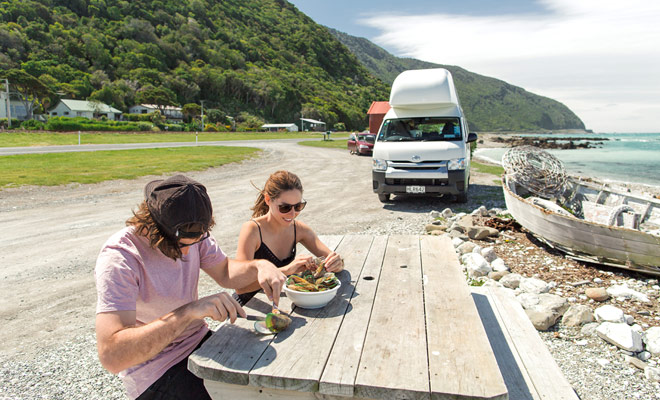
Traveling by motorhome makes it possible to improvise.
You will not become the king of parallel parking with motorhomes, but you will be able to be successful if you follow our practical advice.
Unless a sign tells you otherwise or if you are in a one-way street, you should always park in the direction of the traffic under penalty of fine.
Parking in the city is permitted provided that you have enough space to park your vehicle, which can be easy or impossible to envisage depending on the motorhome model you rent.
Driving a motorhome is already quite delicate without searching for a place to park in narrow streets (especially if you have never driven on the left side of the road).
I would rather recommend the car parks reserved for motorhomes, sometimes even available downtown as in Wellington.
Advice to Park the Motorhome
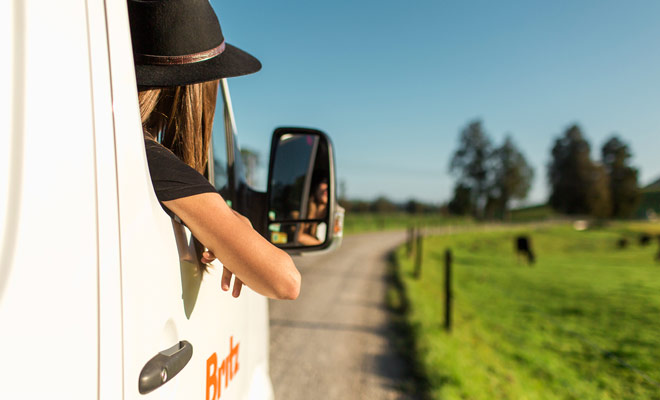
The rearview mirror is essential to park in a camper van.
The maneuver in itself is complicated by the lack of visibility due to the absence of a central mirror. Some recent motorhome models are equipped with a rear-view camera with a monitor, but it is even better to ask your co-pilot to step down to guide the maneuver.
The golden rule is to always take your time, even if the traffic is dense. It is better to be honked by impatient drivers than to damage your vehicle while rushing the maneuver. Honestly, 99% of the scratches on the bodywork are mainly related to awkward parking attempts.
On the other hand, many drivers too often neglect to ensure that the upper parts of the motorhome do not touch any obstacles, such as the roof of a car park or the branches of trees in a camping.
Precautions Before Leaving the Vehicle
Before leaving the vehicle in an isolated area (e.g. at a car park before a hike), I advise you not to pull the curtains completely so as not to give the impression that your vehicle is left unattended.
Do not let your things in evidence inside and if your motorhome has a safe, you would be well advised to store your valuables in it, including passports, but also your electronic devices and your money in cash.
Refueling Tank and Gas Bottle.

Most models of motor homes run on diesel.
The choice of the type of fuel is important for a stay of several weeks. If every motorhome is not equipped with gas (the models without heating for example), you will also need to recharge the gas bottles as well.
New Zealand has passed a law that taxes diesel and makes it unattractive if you rent a car. But for a motorhome, diesel remains the cheapest and most interesting fuel.
Gasoline or Diesel?
On a three-week stay, the diesel engine (noisier than a petrol engine alas) saves up to 30% in fuel costs!
With motorhomes, you realize the full of gasoline as simply as with a car. Stop at a service station, turn off the ignition and unscrew the fuel cap.
The fuels available at the pump are the octane 91, 95, 96, 98, and of course, the diesel.
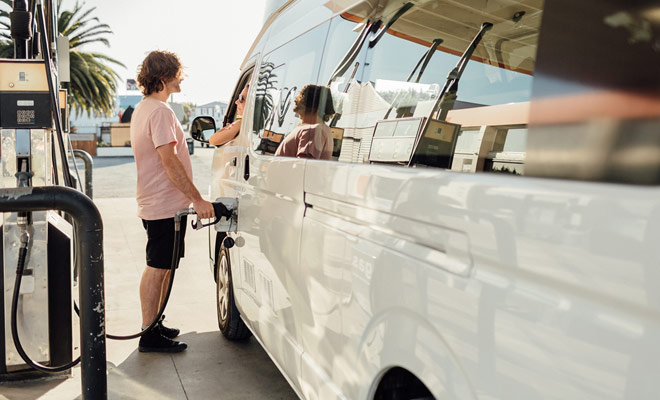
New Zealand service stations operate the same as in Europe.
In case of doubt, please refer to the owner's manual of the motorhome, but the correct type of fuel is usually written on the tank valve. This information is also specified in the technical characteristics of each model proposed in Kiwipal's comparator prior to booking.
Do not wait until the last minute to refuel, because the gas station on a map may turn out to be closed on arrival!
Do not trust the motorhome's manual: real fuel consumption varies depending on terrain, and as New Zealand is basically a country of hollows and humps, your motorhome will often consume more than expected, especially on the South Island.
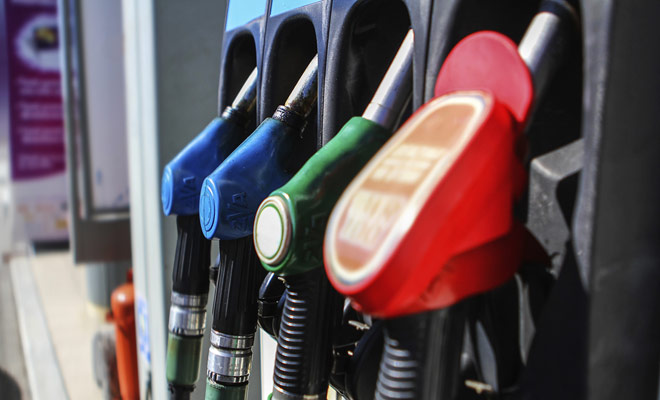
Fuel should be considered in the calculation of the budget.
I recommend noting the counter's value displayed on the dashboard at the start of the trip and then to analyze the distance traveled in order to get an accurate idea of the actual fuel consumption of the motorhome.
Of course, I understand that you need to estimate the fuel cost to estimate a global travel budget. The different fuel prices are updated daily on Price Watch a very useful website tracking fuel prices in New Zealand.
The Rankers mobile app allows you to locate all petrol stations in the country with the average price at the pump: you will have no trouble finding the cheapest station on your route.
Rankers: iPhone and Android applications.
Price Watch : Estimated Gasoline Prices
Fuel costs more on the South Island than on the North Island.
Gas for Heating and Cooking

Heating and hotplates usually run on gas.
The heating in a motorhome generally works with gas, as are the cooking plates of the kitchen part. The autonomy depends on the number of refills and one generally finds a bottle on small models and two on larger ones.
Of course, if you visit New Zealand during the peak season, your heating needs will be far less important and you can recharge on a bi-weekly basis if you cook little or limit the showers.
On the other hand, a full recharge at $30 is to be considered every 10 days on average during the winter or early spring.
How to Refill the Gas Bottle?
The replacement of the gas cylinder (mainly LPG) is not difficult, but some precautions are necessary.
The guide to stations that allow gas bottles refill (most of them actually) is available in the Rankers great mobile application that I've already recommended.
Once parked in the gas station, turn off the motorhome engine and open the outside compartment where the gas cylinder is located with your ignition key. You will find the inlet valve closed, which is normally the case if you have followed the procedure which implies to always cut off the gas supply when driving.
Always close the gas supply before taking the road for safety.
You can then remove the gas bottle and give it to an employee who will fill it out or exchange it. Then put the bottle back in the camper, lock the trapdoor and you can get back on the road.
Petrol stations are not the only ones offering gas refills: most paying campsites also offer this service.
Battery and Electrical Devices.
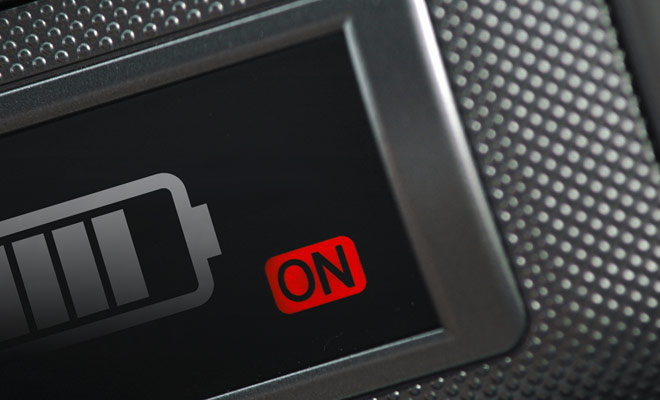
The auxiliary battery is used to power electrical devices on board.
This will be the main novelty of the stay if you have never driven a camper van: the consumption of electric power must be monitored just like the fuel consumption.
Most motorhomes are equipped with an auxiliary battery dedicated to the proper functioning of the lighting and electrical appliances such as a refrigerator.
The auxiliary battery and the motor battery are independent one another. You can always start the camper even if the auxiliary battery powering the electrical appliances is dead.
Note that some electric-powered appliances work only when the camper is connected to an external power source using an AC outlet.
Do not expect to use an oven (including microwave) in the open air.
The motorhome battery must be recharged in campsites equipped with power supply.
Like the engine battery, the auxiliary battery recharges when the vehicle is moving, but this won't be enough to fully recharge the battery, and you must plug the vehicle to a power supply to perform a full charge.
How to Plug Your Electrical Devices?
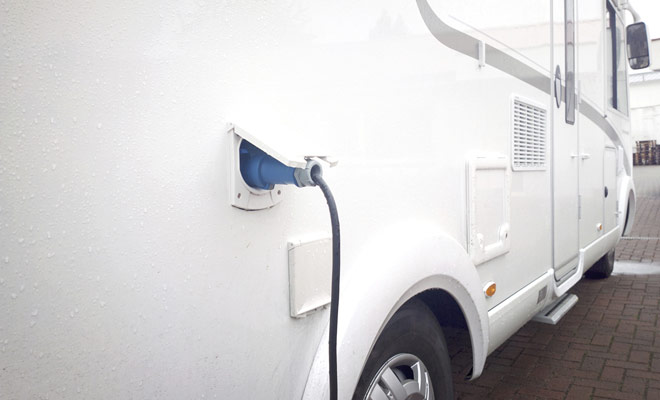
The camper battery is recharged using an AC outlet.
If the voltage in New Zealand is often identical to most countries in the world (230/240 volts), you must nevertheless buy an inexpensive AC adapter (sold especially in airports) because the format of the outlet is different.
The camper has electric plugs to connect your own electrical devices, including laptops, tablets or smartphones. Nevertheless, the vehicle must be connected to the mains power supply when you intend to use them.
How to Save the Battery?
The average autonomy of the auxiliary battery varies between 12 and 48 hours depending on the electrical devices used.
The age of the motorhome model may change the capacity, but from my experience, I would say that one can expect about 20 hours of autonomy with a normal use. You will save the battery by not leaving the lights without reason and avoiding setting the temperature of the refrigerator to the maximum to have ice cubes.
Using a small flashlight with spare batteries is often a better solution for the night.
How to Charge the Battery?
It takes at least two or three hours to recharge the auxiliary battery. Otherwise, you can make a cross on heating, lighting, hot water and even TV! An indicator on the dashboard display the remaining charge.
If your camping place has a power supply, do not forget to recharge the battery during the night. The power cable supplied by the rental company is to be plugged into the 220-volt socket located in a hatch you can open with the vehicle key.
Daily Life in a Motorhome.
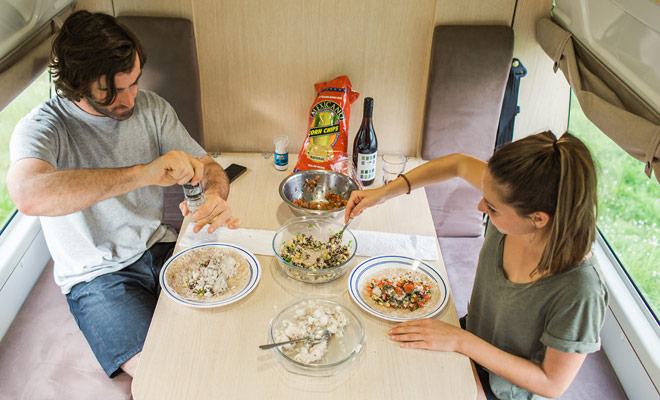
You cook and eat comfortably on board the motorhome.
The motorhomes that have a cabin, in other words a “kitchen area” are equipped with a refrigerator, hot plates, a microwave and some accessories that go from the kettle to the toaster.
As a matter of fact, a motorhome does not have enough energy to power electric cooktops and you will therefore use gas to cook.
The gas used is generally “LPG” (liquefied petroleum gas), and more rarely butane, because it has the major disadvantage of freezing in winter.
Some rental companies may ask you to pay an extra for a full-gas charge at the intake of the vehicle, but the tariff remains reasonable (about $25).
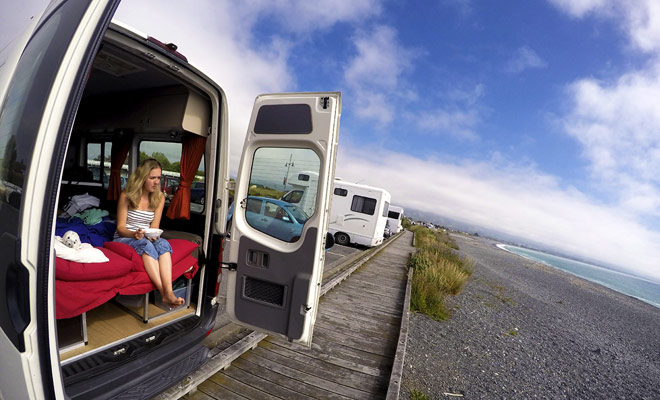
Only the motorhome allows you to wake up in such conditions.
The gas is also used to power the heating system, but some camper models offer only electric heating that works when the vehicle is connected to a power supply, which restricts somewhat the possibility to park where the you want. In any case, the use of heating during the summer months remains marginal and you won't be cold under a duvet.
Using gas is not dangerous, but imposes some basic safety rules.
Safety Instructions for Gas Cooking
Before taking the road, you must systematically shut off the gas supply by operating a lever in the compartment where the gas bottle is installed.
Cooking by opening the window or the ventilation hatch of the motorhome is an essential rule, and it is no coincidence if you find a fire extinguisher near the hob.
A rule that may seems obvious to most people, but some rental agents told me edifying anecdotes about customers who were cooking while driving, so I would rather prevent than cure!
It is forbidden to smoke on board a motorhome, in particular because of the gas heating system.
Do I need to specify that smoking is prohibited in a motorhome? The rental companies forbid to smoke because they don't want to recover a vehicle impregnated with a tobacco smell and with holes in the chairs, and you can count on them to debit your deposit at the slightest breach of the rule.
New Zealand plans to ban cigarettes from its territory, after having already excluded it from public places as in many European countries.
Why You Should Hide Your Belongings?

Your luggages should be carefully stored during the trip.
The motorhome is a house on wheels (in any case an apartment on wheels), but you cannot afford to have all your stuff in disorder aboard.
When you take the road, all the things that are not stowed in the cupboards will leave their place at the first hairpin turn and fly into the cockpit. Even a simple iPad can turn into a dangerous projectile if you brake abruptly in front of an obstacle.
Adopt a responsible attitude and respect the safety instructions communicated by the rental company.
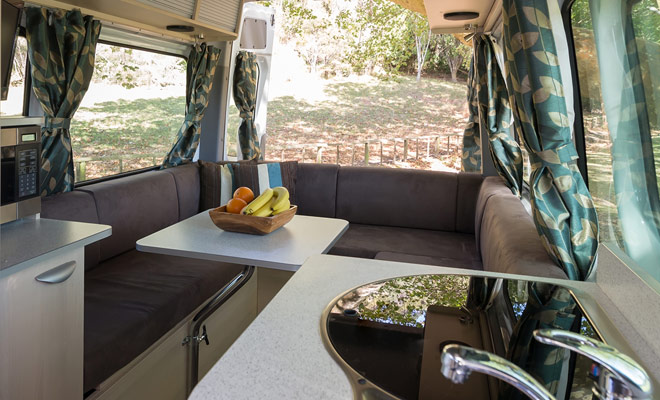
The camper provides autonomy without sacrificing comfort.
Another aspect (which is neglected too often) is not to provide a few bottles of mineral water in reserve when you plan to move away from the beaten tracks. We will see in the next section that the consumption of drinking water goes fast with a motorhome, especially when traveling with a family.
Dump Station and Drinking Water Refill.

The water tank is also used for the shower on board.
A motorhome equipped with amenities and a shower, has a tank of drinking water of 40 to 100 liters that one consumes more or less quickly according to its habits or the number of passengers. You will have to refill the drinking water tank every two or three days, or less often by rationing (but is it the spirit of the holidays?).
To limit the water consumption (and to limit the bad odors ...), I recommend you to use the public toilets rather than those of the motorhome each time you have the opportunity.
Which brings me to a subject that is not very pleasant, but which must be treated well in a guide that wants to be exhaustive: the dump station usage...
Be aware that there are two types of wastewater: the gray and black ones (do you really need a picture?). Both of them obviously cannot be evacuated anywhere in the nature under the penalty of a $10000 for “wild dumping”.
Where Are the Dump Stations?
The operation is carried out in the sewage treatment plants called “dump station” that are also available at gas stations or campsites. You will easily recognize them with their explicit logo on a blue background. The network of dump stations is wide and you will never have to drive long to find one station free. An indicator on the dashboard will tell you when you need to find a dump station.
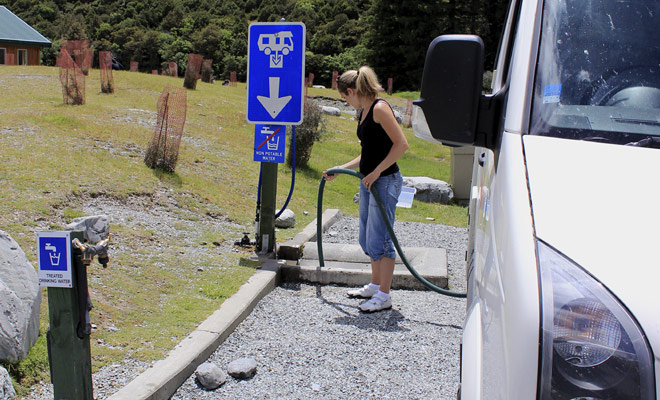
Hundreds of dump stations are available free of charge.
When one speaks of a dump station, toilets and black waters, one immediately imagines something disagreeable ...
But fortunately, the camper-van would not be as popular if the draining was a real chore! The maneuver is simple and non-dirty (even if you wash your hands after performing it). Each dump station has a special pipe with a metal lid that should be lifted. Under it, you will find two connectors: one is for the toilet cassette and the other is for the waste water from the shower and the sink.
Modern stations have a single universal connector.
How to Empty the Toilet Cassette?
The first step is to remove the cassette from the toilet (it is indeed just a simple small cassette). It is stored outside the motorhome in a small hatch to open with the ignition key. Simply press a button and pull a handle to pull out the cassette.
Then place the gutter part of the cassette (always closed at this stage) on the wastewater duct. Press the cassette drain button and the contents will be emptied in no time.
Rinse the inside of the cassette with the water inlet next to the dump station and add the chemical bottle or tablet supplied by the rental company (or sold in supermarkets). Add the equivalent of two glasses of water and you can close the cassette and put it back in the camper.
How to Drain the Wastewater?
The draining of “gray water”, that is to say the waste water from the sink and the shower is even simpler to achieve. You must simply connect the outlet marked “waste” to the outside of the motorhome with the exhaust connector of the dump station. The hose required for this maneuver is usually stored in the motorhome with other cleaning products. Simply screw the hose and lower a handle to empty the waste water tank, it's easy!
How to Fill up the Tank With Drinking Water?
But you must not leave without filling up the tank for the drinking water, the shower and the sink! First of all, make sure that the dump station you have chosen has potable water. Do not fill your tank with the water intended to wash the toilet cassette, for example!
Draining or refilling the drinking water tank is not difficult at all!
The connection to feed the camper with drinking water is made using a small hose that you cannot confuse with that used for wastewater. The connection is made on a specific arrival of the motorhome that the rental company agent will indicate to you during the delivery of the vehicle. Ultimately, the complete emptying will only take you a quarter of an hour on your holiday! Take advantage of the opportunity to deposit your trash while respecting the selective sorting, and you will be able to resume the road.
Boarding the Ferry With the Motorhome.
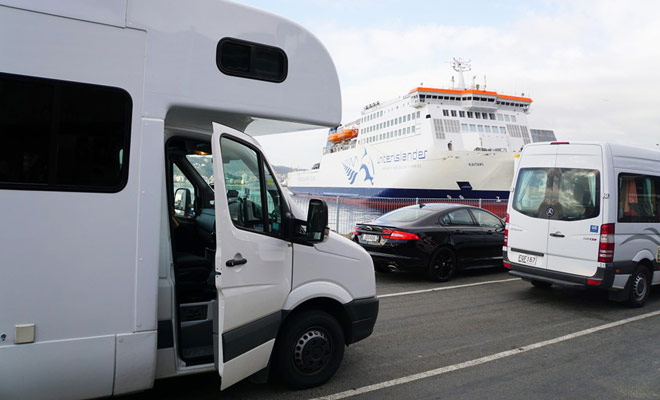
Kiwipal recommends boarding the motorhome on the ferry.
If you plan to visit the two main islands of New Zealand during your stay, you will board the ferry that connects Wellington to Picton (and vice-versa). Travelers who rent a car can change of vehicle from one island to another, but with motorhomes it is customary to embark the vehicle on the ferry.
Crossing the Cook Strait on the Interislander or Bluebridge takes about 3 hours (Bluebridge is a bit slower). The procedure for embarking passengers is similar to that of an airplane, and you must respect the instructions and schedules established by the Ferry company.
Motorhome transportation by ferry does not come for free, but the rate between $110 et $170 depending on the size of the vehicle is not excessive.
You will have the advantage of not losing time in rental agency formalities to rent another vehicle on the other island, and you will not have to check in your luggage before boarding the ferry.
The Boarding Procedure to Follow

Getting on the ferry is no more difficult than parking the vehicle.
You have a maximum of one hour before departure to register your motorhome and embark it on the ferry. Do not forget the e-tickets with your booking numbers.
You can follow the boarding procedure while the rest of your family normally embarks with passengers without vehicles, but in this case you will have to perform the check-in at the terminal altogether before. To simplify your life, it is better that everyone accompanies the driver of the motorhome.
You will therefore drive your camper van inside the ferry and a member of the staff will be told where to park (you cannot to choose your place). Keep in mind that attendants apply safety precautions similar to those of an airport. Do not try to negotiate or go faster than music.
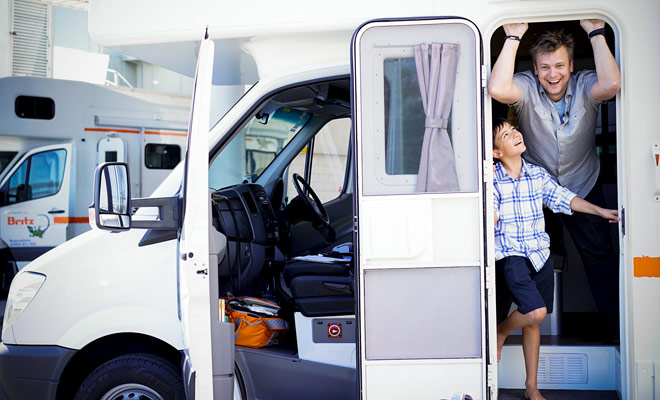
Embarking the camper on the ferry is the simplest solution.
In order not to slow down the procedure, make sure you have switched off the gas supply of the motorhome, and if you board in the evening or early in the morning, turn off your headlights to avoid dazzling the boarding staff. Hand luggage that you wish to keep for the crossing must be already ready (your other luggage remain in the vehicle).
Parking a vehicle in the ferry only implies to go straight ahead, which presents no difficulty.
Stay aboard the camper while waiting for your turn and wait until someone asks you to move slowly to a free place.
Then turn off the engine, put the handbrake, and leave the motorhome with the other passengers, because nobody must remain in the vehicle during the crossing. Close the camper with your key and follow the markings on the ground to reach the areas reserved for passengers.
At the end of the crossing, the procedure will be simply reversed and you will be able to resume the journey as soon as you have disembarked.
Booking the Interislander Ferry
Booking the Bluebridge Ferry
Do not forget to take cash, your camera and a good sweater, because during the crossing you will be able to buy food and to walk on the bridge to admire the landscapes. The wind blows hard, and you must be covered to avoid getting cold.
Car or Motorhome?

The motorhomes have evolved to become more manageable.
The motorhome has some disadvantages, but its main benefit compared to an auto tour (car + hotel) is the freedom to modify the itinerary along the way to get off the beaten track.
The weather forecast announces rain where you are, but a sunny place is only 50 km away?
Just take a look at the campsites map, spot some alternate activities and hit the road to reach the location where the weather is nicer! You may not always escape rain every time, but a motorhome can save a day all by itself.
Beware, however: a well-organized motorhome trip will save a great deal of money, but if you do not plan your itinerary during the high season, this transport could be as expensive as an auto tour stay.

The motorhome is the ideal solution for a family holiday.
That said, the choice of the motorhome is not dictated by the sole purpose of saving money or the desire not to unpack the luggage every night at the hotel.
The motorhome is primarily a state of mind, a search for freedom: a principle that goes beautifully with New Zealand.
Of course, driving a motorhome is not as simple as driving a car. You drive more slowly and have to park carefully.
But the few imperatives like the using the dump stations are not nevertheless insurmountable chores and only take a few minutes on your holidays.

The camper van is synonymous of freedom in New Zealand.
The motorhome trip makes it possible to enjoy real breaks, not to eat on the go, taking advantage of the markets to eat with less fat food, which helps to avoid feeling exhausted after many days on the road. Finally, and if you need only one more argument to convince you, the motorhome is the most suitable means of transport for family stays. Whether visiting New Zealand with children or parents, the motorhome forges unforgettable memories, especially among the younger ones.
The motorhome is perfectly suited for a family holiday or a road trip as a couple.
This will be the last word for this guide, the longest proposed up to date on Kiwipal.
If I have not yet exhausted your patience, I suggest that you also take a look on our New Zealand driving guide or the one dedicated to the car rental if you are still hesitant about the means of transportation.
Our friend Ben the Kiwi awaits you with his traditional Question & Answer section devoted to the motorhome rental. I wish you a very pleasant journey in New Zealand.


Questions & Answers.

What can I do for you? If you have any questions about renting motorhomes in New Zealand, please contact me, I will be glad to help you.
- All topics ... 20 answers in total
- The Choice of the Camper-Van 5 answers
- Electrical Devices 5 answers
- Online Booking 4 answers
- Driving a Motorhome 3 answers
- The Ferry Crossing 1 answer
- Draining the Camper-Van 1 answer
- Security 1 answer
The Choice of the Camper-Van
- How much does a motorhome rental cost?
This is a tricky question, as it all depends on the duration of the rental, the model of the vehicle, the season ... so many parameters that can give price differences of several hundred euros. You can very easily make yourself an idea using the comparator proposed by Kiwipal.
- Can we rent a 2 + 1 motorhome type for 3 adults?
Not to the extent that the third bed is intended for a child and that an adult will be cramped in the berth and may even be downright unable to use it. You may also be in breach of the rules set out in the rental agreement.
- Should we prefer an automatic gearbox?
If you have never driven on the left side of the road, you should always opt for an automatic gearbox. You need to stay focus on the road, so do not add an extra difficulty.
- What is the difference between a motorhome and a minivan?
If it is more compact and more manageable, the minivan is distinguished essentially by its absence of conveniences (kitchen, shower, sanitary ...).
- Should we rent a recent model?
It is especially necessary to study the characteristics of the motorhome that you intend to rent. Of course, a model of less than five years will be in better condition, but if it does not have the shower you need, it will not do the trick.
Electrical Devices
- Are there cigarette lighter sockets on board?
The vast majority of camper vans have cigarette lighter sockets. If one is not allowed to smoke on board for ages, the cigarette lighter socket is now standard for powering GPS and all kinds of accessories.
- How to recharge a smartphone easily?
I advise you to buy a USB type adapter for cigarette lighter socket. You will find this article for a few bucks on eBay or a little more expensive at airports.
- Can I recharge my electronic devices in the camper?
Yes, provided the motorhome is connected to a power supply. But you can also recharge your small electric devices when driving thanks to the cigarette lighter socket if you have an adapter.
- Do I need a power adapter to plug my devices?
Yes, because the size of the sockets is not always the same. Fortunately the voltage is identical to the one used in most European countries, which brings back the purchase of an adapter at a ridiculous price.
- Can we watch TV in a camper?
Yes, most models are equipped with a small TV with a DVD player.
Online Booking
- Why was my booking request refused?
Booking requests are confirmed within 24-48 hours on average. But these are simple booking requests. If you are asked to fill in your bank details, it is above all to ensure that your request is serious, because the work of the teams to block the vehicle from the rental companies takes time. Your account will not be debited if the rental is not confirmed.
- Can we book at the last minute?
Nothing prohibits it, but you are unlikely to find a motorhome in these conditions, except in low season from April to September. To rent the best models of the market, it is better to book about 4 to 6 months in advance!
- How long is the minimum rental period ?
The average is 7 days, but some renters accept 5 days.
- Can I cancel a booking?
Yes, if you respect the conditions established during your reservation. The time limit for cancellation varies from one rental company to another and part of the costs can be withheld if you change your mind at the last minute.
Driving a Motorhome
- Can I park at any location?
You must park only at an authorized location. Freedom camping is possible in some places, but you must first make sure that the owner agrees.
- Are we allowed to drive in town?
Yes, but it is necessary to pay attention to the signage so as not to borrow a street prohibited to heavy vehicles. One example is the famous Baldwin Street in Dunedin, where it is impossible to turn around with a motorhome.
- Can we park in the city?
Yes, as long as you park the vehicle in the direction of traffic and if the vehicle dimensions do not extend beyond the parking area. If the camper van is wider than a car, the exercise will be very difficult and it is best to locate a motorhome parking in advance.
The Ferry Crossing
- Can we book the ferry at the last minute?
During the high season, it is imperative to book the ferry for both passengers and vehicles. Otherwise, you may simply not be able to find any available places at the last minute. In low season, there is always room for passengers, even at the last minute, but there may be no more places to park your vehicle! I recommend not playing with the fire and book at least a few days in advance during the winter months.
Draining the Camper-Van
- What chemical to use for the toilet cassette?
Most chemical toilet fluids or chemical toilet tablets sold in service stations and supermarkets will do the trick.
Security
- Is it safe to drive a motorhome?
A motorhome requires a little more concentration while driving, but is not dangerous per se. I would say that it is primarily driving, regardless of the type of vehicle that can be dangerous if you do not comply with the Highway Traffic Act, or if you are not vigilant. If you drive carefully and respect the braking distances, a camper-van is no more dangerous than a car.

